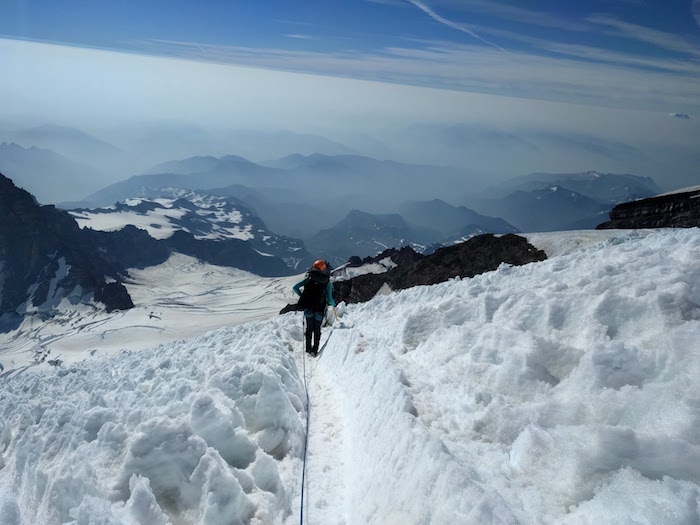August 21, 2017
Hiking and backpacking in remote (and awesome) places such as mountains and glaciers often means reaching higher altitudes than where we normally live. The higher we climb the more the effects of altitude will be felt, such as increased perception of effort (it becomes more difficult to perform the same task) and increased ventilation (breathing more heavily). Some effects of altitude are less noticeable, yet just as significant, such as changes in fluid needs.

Fluid (liquids) needs increase with greater altitudes for a few reasons:
- Air tends to be dryer at higher altitude, which increases loss of moisture through sweating
- Accelerated breathing especially in dry air, increases the loss of moisture from the lungs
- In addition, the greater need for energy increases the need for fluid intake
Do you still need another good reason to remain hydrated at high altitude? Being dehydrated can intensify symptoms of acute altitude sickness! In fact, a study looking into the training of soldiers at 1500m (≈5000 ft) to 2500m (≈ 8200 ft) showed that dehydration was directly linked to these symptoms. Dehydration can also exacerbate the negative effects of hypoxia (or low oxygen availability), which means that performing any given effort becomes even more difficult when dehydrated + at altitude!
How much do we need to drink?
Fluid needs varies greatly from one person to another, so suggesting specific recommendations to suit all is impossible. However, there are a few tips that apply to all and bear remembering on your next trip:
- At 1500m (5000 ft) and above, increase your fluid intake compared to what you normally drink at lower altitude. This is especially true in the first 2-3 days at higher altitudes.
- Drink fluids mainly in the morning and afternoon to avoid numerous trips to the toilet at night.
- Frequency of “bathroom” breaks can indicate how hydrated you are.
- The electrolyte content of sports drinks helps to retain more fluids and thus, stay hydrated. Water along with salty foods can also be very helpful.
- Alcohol isn’t considered a “fluid” in these recommendations because alcohol dehydrates!
Stay safe out there and enjoy!
By Gen Masson, MSc, RD, CD
References:
Burke, L. D., V. (2015). Clinical Sports Nutrition (5th ed.): McGraw-Hill Education (Australia) Pty Ltd.
Koehle, M. S., Cheng, I., & Sporer, B. (2014). Canadian Academy of Sport and Exercise Medicine position statement: athletes at high altitude. Clin J Sport Med, 24(2), 120-127.
Norris, J. N., Viirre, E., Aralis, H., Sracic, M. K., Thomas, D., & Gertsch, J. H. (2012). High altitude headache and acute mountain sickness at moderate elevations in a military population during battalion-level training exercises. Mil Med, 177(8), 917-923.

